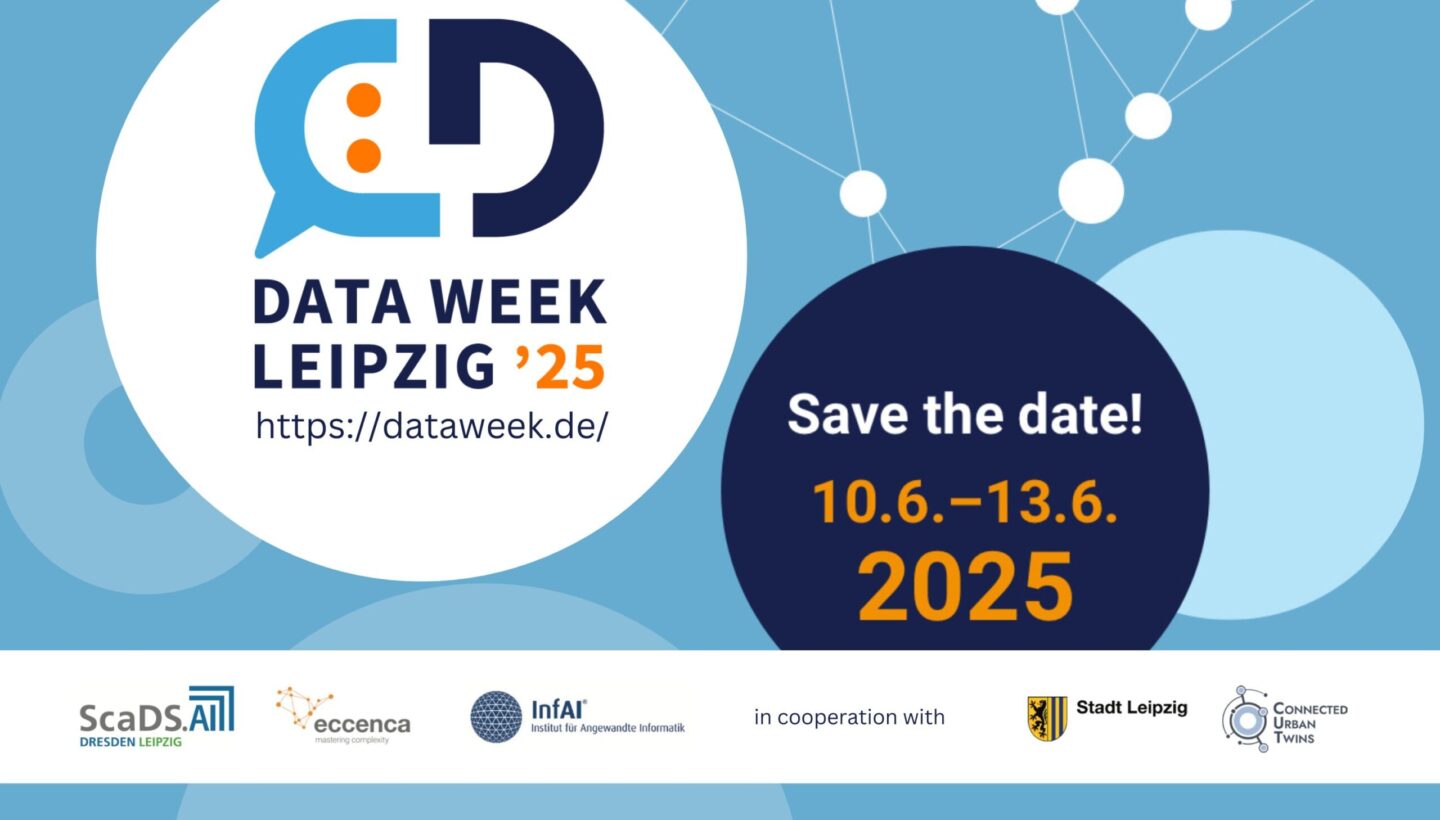ScaDS.AI Meetup x Data Week Leipzig 2025
Bringing AI into practice, but how?

Data Week Leipzig is a Forum for Data and AI Enthusiasts in Leipzig hostet by Institut für Angewandte Informatik e. V, eccenca GmbH and ScaDS.AI Dresden/Leipzig. This year’s event will take place from June 10 to 13. It brings together representatives from public authorities, industry, science and business and highlights the scientific, economic and social perspectives of data and its use. Students, trainees and interested members of the public are also invited to take a look behind the scenes or to take part in the various further education courses on offer at Data Week Leipzig.

The four-day program focuses on a different topic each day, with this year’s focus on climate and energy. The Data Week also includes various formats such as the Leipzig Semantic Web Day (LSWT), the KMI Transfer Day and the Civic Coding Roadshow. There will also be hackathons and datathons as well as training sessions and workshops organized by the participating science and transfer institutions.
Find out more about this years’ program in the program overview on the official website.
As part of Data Week 2025, ScaDS.AI Dresden/Leipzig is offering the following hands-on sessions and trainings for interested scientists, students, and especially non-scientific users:
Oliver Welz (ScaDS.AI Dresden/Leipzig)
The ScaDS.AI Meetup is a dynamic exchange platform for local and regional players that offers exciting insights into cutting-edge research in the field of AI. We invite companies, researchers, technology enthusiasts and all interested parties to exchange ideas, network and share their AI success stories in a relaxed atmosphere. Take the opportunity to discover new perspectives, have inspiring conversations and explore potential collaborations. Look forward to exciting talks, interactive demos, workshops and panels. Become part of a growing community that is actively shaping the future.
In this presentation, you will learn how DBpedia Enterprise links heterogeneous data sources such as Wikipedia, Wikidata and Linked Open Data – in real time and with stable, searchable knowledge graphs. The technology not only enables effective data integration for companies, libraries and research institutions, but also presents a sustainable business model in the open data environment. Learn from concrete application examples how DBpedia can be used as a knowledge backbone and what role it plays in the “Web of Data”.
How do we as a technology company manage to successfully implement AI projects? In which use cases does generative AI really bring an advantage? What AI blockades do we experience in our daily work and how do we solve them? The fact is: the AI potential is huge and affects all industries. The presentation will show interesting examples from sectors such as tourism, insurance and robotics. MaibornWolff, an established IT service provider with a focus on sustainable digitalization and AI, will report on its own practical experience.
Graph databases are essential for many AI applications that focus on relationships between data. Neo4j, one of the leading providers in this field, will present how companies can use graph technology to analyze complex relationships, identify patterns and make informed decisions. The presentation will provide practical insights into fields of application such as fraud detection, recommendation systems and knowledge management.
“See one, do one, teach one” is the motto of Pamemo. The AI-supported learning app enables practical and interactive education on a smartphone from the comfort of your own home. It is currently being used in Leipzig and Africa to train doctors – primarily on the topics of resuscitation and antibiotic therapy.
Unlike simple wrappers around AI models, Pamemo combines various technologies to provide reliable and verifiable content – even in sensitive areas of application.
Supported by SAB validation funding, Pamemo is open to cooperation with universities, educational institutions and partners who train and educate specialists.
Contact: Adrian Viehweger and Sebastian Driesnack.
alphaspeech voicebot was developed for applications where data protection, flexibility and domain-specific adaptability are paramount. Voicebots can be optimally adapted to the respective speech domain, the application context and specific usage requirements. The modular framework is based on open source technologies and in-house developments in the areas of speech recognition (ASR), natural language understanding (NLU), dialog management and speech synthesis (TTS). By dispensing with the integration of third-party services, voicebot can be operated completely on-premises or on-device. This means that the highest data protection and data security requirements can be met.
The dialog management supports different types of interaction – from clearly structured, rule-based dialogs and model-based slot filling to open conversations based on large language models (LLMs) and retrieval augmented generation (RAG). The solution can be flexibly integrated – e.g. on websites, in mobile applications or as a voice assistant for telephone hotlines. An animated avatar is optionally available, whose appearance and voice can be adapted to the target group or the corporate design of target applications.
Contact: Dr.-Ing. Felix Gräßer [Product Owner Speech Technologies, alpha NT GmbH]
Registration is required for participation.
Bringing AI into practice, but how?

Dr. rer. medic. Robert Haase (ScaDS.AI Dresden/Leipzig)
Modern AI-driven chat apps such as ChatGPT, Gemini, Claude and others are changing the way we work unavoidably. For many, this means writing texts or programming more efficiently. Some people overestimate the quality of generated text and may not admit that they have not curated AI-generated text properly. About 20 years ago we had to learn how to “google” properly, today we need to learn how to “prompt”. In this lecture, we will give an insight into various challenges that the current AI revolution is imposing on us and a number of opportunities in this context. The lecture gives examples, tips and tricks for dealing with Generative AI and will be followed by a practical part. It is recommended that you bring your own laptop to take part.
Matthias Täschner (ScaDS.AI Dresden/Leipzig) and Dr. rer. medic. Robert Haase (ScaDS.AI Dresden/Leipzig)
Learn the basics of modern software development in this hands-on course: from version control with Git and automated testing to workflows for continuous integration and deployment. Discover topics such as reproducible environments and software licensing and apply your knowledge directly in interactive exercises. Perfect for anyone who wants to make their development processes more efficient and professional. Target group: Employees in industry and administration with basic knowledge of Python programming and the desire to work in a more structured and collaborative way and to sustainably increase code quality.
You must purchase a ticket to participate in Data Week Leipzig.
Get your ticket here.
Students can upload their certificate of study in the ticket store and will receive a discounted ticket after verification. We provide a limited number of tickets.
Neues Rathaus
Martin-Luther-Ring 4 – 6
